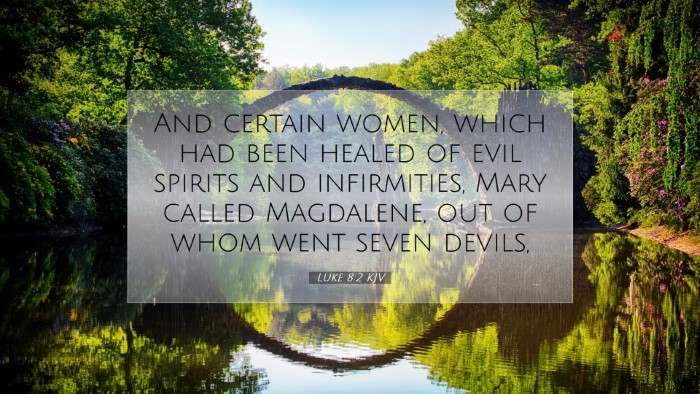Commentary on Luke 8:2
Luke 8:2 reads: "And certain women, which had been healed of evil spirits and infirmities, Mary called Magdalene, out of whom went seven devils,". This verse provides profound insights into the ministry of Jesus, His impact on individuals, and the early role of women in the Christian community. The commentaries of Matthew Henry, Albert Barnes, and Adam Clarke shed light on several dimensions of this text, revealing its theological, historical, and social implications.
Background Context
This verse occurs within the broader narrative of Jesus' ministry in Galilee, illustrating the transformative power of His healing and deliverance. Luke emphasizes the involvement of women in Jesus' ministry, indicating their significance among His followers.
The Healed Women
The mention of women who were healed signifies both the compassion of Jesus and the inclusivity of His message. According to Matthew Henry, these women represent a diverse group who experienced personal liberation through Christ. Each woman's story contributes to a collective narrative of redemption.
Mary Magdalene
- Identity and Significance: Mary Magdalene holds a prominent position in the Gospel accounts. Adam Clarke notes that she is distinctively named and recognized, emphasizing her transformative journey from possession to discipleship.
- Spiritual Warfare: The "seven devils" that departed from her symbolize a complete and overwhelming state of torment and despair. Albert Barnes explains that the number seven often signifies fullness in biblical literature, indicating the depth of her previous affliction.
- Redemption and Mission: Upon her healing, Mary became a devoted follower of Christ. This underscores a consistent theme in Scripture where those who experience God's mercy often become His most fervent servants.
Implications for Ministry
This verse encourages a reflection on the role of women in the ministry. Henry points out that the active participation of these women not only in following Jesus but also in ministering to Him and others during His travels is a testament to their faith and dedication.
The Role of Women as Disciples
- Active Participants: Women were not mere bystanders; they supported Jesus’ ministry materially and spiritually. These contributions are highlighted in their actions of providing for Him out of their resources (as indicated in later verses of Luke 8).
- Spiritual Influence: The involvement of women like Mary Magdalene in spreading the message of Jesus reflects their significant influence in the early church. Their testimonies were crucial in proclaiming His resurrection and the Good News.
Theological Insights
This verse also serves as a theological lens through which we can understand the nature of Jesus' ministry. He engages with the marginalized and oppressed, offering hope and healing.
Healing and Restoration
- Christ's Compassion: The deliverance of Mary Magdalene illustrates Christ's empathy and the holistic nature of His healing—spiritually, mentally, and physically. His approach invites all people, regardless of their past, to experience His grace.
- Message of Hope: Mary’s transformation serves as a powerful reminder that no one is beyond the reach of God’s redemption. Clarke comments on the universality of Christ’s mission, which includes salvation and healing for all souls.
Historical and Cultural Context
Understanding the cultural context of first-century Judea is essential for grasping the significance of this verse. Women were often marginalized in society, yet Jesus’ acknowledgement of them challenges these societal norms. Barnes notes that by including women in His ministry team, Jesus elevated their status, which was revolutionary for the time.
Women in Early Christianity
- Breaking Barriers: The presence and mention of women who followed Christ depict a breaking down of barriers in terms of gender and societal roles. Their involvement was pivotal during the early days of the church.
- Legacy and Influence: The examples set by these women continue to inspire modern-day discipleship and service, showcasing that God's call transcends traditional limitations.
Conclusion
Luke 8:2 portrays a powerful narrative of redemption and the active role of women in Jesus’ ministry. Through the insights from Matthew Henry, Albert Barnes, and Adam Clarke, we see that Jesus offers hope, inclusivity, and healing to all, regardless of their past. This passage resonates with pastors, scholars, and Christians today, encouraging a deepened understanding of the transformative power of Christ’s love and the vital role of women in the story of the Gospel.


